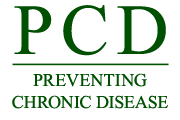PCD News Summary for June 22, 2017

Notice to News Media – PCD Release Time and Embargo Policy:
CDC’s News Media Branch releases to reporters the PCD media packet every Tuesday afternoon between 12 and 2 pm.
Embargoed until Thursday, June 22, at 12:00 PM ET
Giving It Our Best Shot? Human Papillomavirus and Hepatitis B Virus Immunization Among Refugees, Massachusetts, 2011–2013
Melissa Newton
mnewton@cdc.gov
404-718-6281
Rates of human papillomavirus (HPV) immunization were found to be higher among refugee adolescents resettled in Massachusetts than among the general adolescent population in the United States. This finding may be attributed to the standardization and normalization of HPV immunization among refugees in specialized refugee clinics. Researchers examined human papillomavirus and hepatitis B virus immunization rates among 2,269 refugees age 9 to 26 years who resettled in Massachusetts from 2011 through 2013. Forty-five percent of U.S. adolescents age 13 to 17 years received at least one dose of human papillomavirus vaccine, compared with 68 percent of similarly aged refugees. Males, refugees older than 13 years, and refugees not from sub-Saharan Africa were less likely to receive human papillomavirus vaccine, while arrivals in 2012 through 2013 were more likely to receive this vaccine than those arriving in 2011. Refugees older than 13 years were less likely to receive two doses of hepatitis B virus vaccine than older refugees. It is hoped that through universal clinician recommendation and through standardization and normalization of immunization, immunization of refugees and other children will continue to rise.
Overweight, Obesity, and Extreme Obesity Among Mississippi Adults, 2001–2010 and 2011–2015
Melissa Newton
mnewton@cdc.gov
404-718-6281
During the 10-year period from 2001 to 2010, overweight prevalence decreased significantly while obesity and extreme obesity prevalence increased significantly among Mississippi adults. Researchers used the most current statewide data available to examine trends in the prevalence of overweight, obesity, and extreme obesity among adult Mississippians from 2001 to 2010 and from 2011 to 2015. The magnitude of the decline in overweight prevalence differed across subgroups during this 10-year period and was smaller among blacks than whites. In the subsequent five-year period, from 2011 to 2015, the only significant change observed was an increase in the prevalence of extreme obesity among white adults.
###
Note: Not all articles published in PCD represent work done at CDC. In your stories, please clarify whether a study was conducted by CDC (“a CDC study”) or by another institution (“a study published by CDC”). The opinions expressed by authors contributing to PCD do not necessarily reflect the opinions of CDC or the institutions with which the authors are affiliated. PCD requests that, when possible, you include a live link to the article in your stories.
###
U.S. DEPARTMENT OF HEALTH AND HUMAN SERVICES
CDC works 24/7 protecting America’s health, safety and security. Whether diseases start at home or abroad, are curable or preventable, chronic or acute, stem from human error or deliberate attack, CDC is committed to respond to America’s most pressing health challenges.
- Page last reviewed: June 29, 2017
- Page last updated: June 29, 2017
- Content source:



 ShareCompartir
ShareCompartir